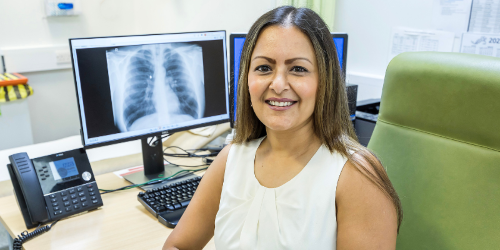
Frimley Health is leading a trial of artificial intelligence (AI) in radiology to help cancer patients to be treated more quickly.
The AI technology was introduced earlier this year to test its ability to scan thousands of breast and chest images and prioritise those which detect cancer and suspected abnormalities.
The initial results have confirmed the potential of using AI for early detection and treatment of lung cancer with 99.7% accuracy in triaging scans as normal and it identified all cancer cases – even the inconspicuous cancer risk nodules that may traditionally have remained unnoticed.
The technology, developed by Qure.ai, highlights abnormal scans so radiologists can focus on reporting the urgent cases first, giving patients a faster diagnosis and quicker access to treatment.
The technology also demonstrated the potential to reduce consultant radiologist’s workload by up to 58% by transferring cases to radiographer reporting workload. This could save radiologists up to two hours per day, freeing up time to concentrate on specialist and complex imaging reports.
Consultant radiologist Dr Amrita Kumar, who is leading the trial at Frimley Health, was named among 2022's Top 50 influential women in AI for leading innovation in the use of AI within the NHS.
Dr Kumar said: “This is a very exciting time for the future of AI technology within the NHS and we are delighted to be leading the implementation with this important six-month study. AI has a huge potential impact for assisting clinicians and radiologists with triaging and prioritising urgent findings, speeding up the cancer diagnosis pathway, and improving the patient journey.”
Darren Stephens, senior vice president and commercial head UK and Europe of Qure.ai comments: “The looming radiologist shortage, now estimated by Royal College of Radiologists to be 40% by 2027, underscores the importance of healthcare AI to help bridge the human resource gap and ensure the delivery of the highest standard of patient care into the future. The study at Frimley Health NHS Foundation Trust is testimony to the clinical leadership at the Trust in embracing AI as an opportunity for positive change.”

